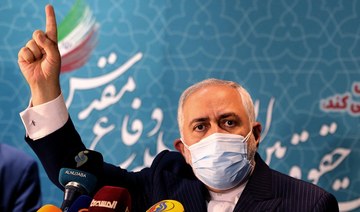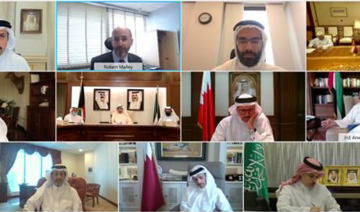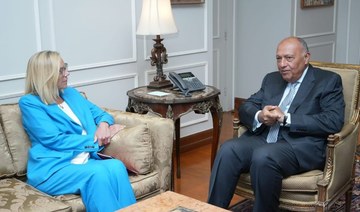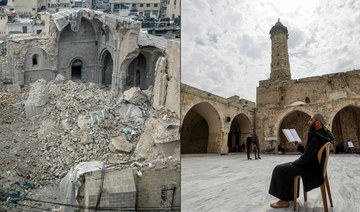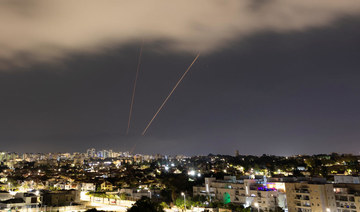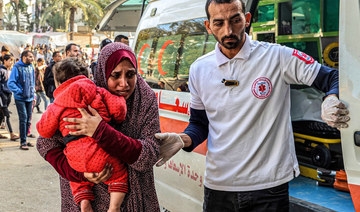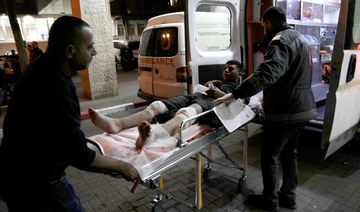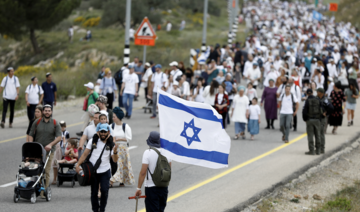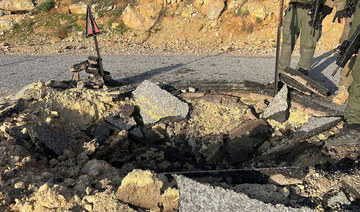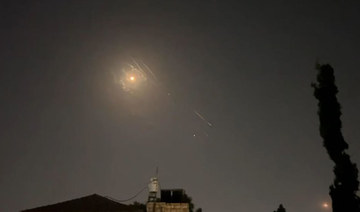DUBAI: An American warship fired warning shots when vessels of Iran’s paramilitary Revolutionary Guard came too close to a patrol in the Arabian Gulf, the US Navy said Wednesday. It was the first such shooting in nearly four years.
The Navy released black-and-white footage of the encounter Monday night in international waters of the northern reaches of the Arabian Gulf near Kuwait, Iran, Iraq and Saudi Arabia. In it, lights can be seen in the distance and what appears to be a single gunshot can be heard, with a tracer round racing across the top of the water.
Iran did not immediately acknowledge the incident.
The Navy said the Cyclone-class patrol ship USS Firebolt fired the warning shots after three fast-attack Guard vessels came within 68 yards (62 meters) of it and the US Coast Guard patrol boat USCGC Baranoff.
“The US crews issued multiple warnings via bridge-to-bridge radio and loud-hailer devices, but the (Guard) vessels continued their close range maneuvers,” said Cmdr. Rebecca Rebarich, a spokeswoman for the Mideast-based 5th Fleet. “The crew of Firebolt then fired warning shots, and the (Guard) vessels moved away to a safe distance from the US vessels.”
She called on the Guard to “operate with due regard for the safety of all vessels as required by international law.”
“US naval forces continue to remain vigilant and are trained to act in a professional manner, while our commanding officers retain the inherent right to act in self-defense,” she said.
The last time a Navy vessel fired warning shots in the Arabian Gulf in an incident involving Iran was in July 2017, when the USS Thunderbolt, a sister ship to the Firebolt, fired to warn off a Guard vessel. Regulations issued last year give Navy commanders the authority to take “lawful defensive measures” against vessels in the Mideast that come within 100 meters (yards) of their warships.
While 100 meters may seem far to someone standing at a distance, it’s incredibly close for large warships that have difficulty in turning quickly, like aircraft carriers. Even smaller vessels can collide with each other at sea, risking the ships.
The incident Monday marked the second time the Navy accused the Guard of operating in an “unsafe and unprofessional” manner this month alone after tense encounters between the forces had dropped in recent years.
Footage released Tuesday by the Navy showed a ship commanded by the Guard cut in front of the USCGC Monomoy, causing the Coast Guard vessel to come to an abrupt stop with its engine smoking on April 2.
The Guard also did the same with another Coast Guard vessel, the USCGC Wrangell, Rebarich said.
The interaction marked the first “unsafe and unprofessional” incident involving the Iranians since April 15, 2020, Rebarich said. However, Iran had largely stopped such incidents in 2018 and nearly in the entirety of 2019, she said.
In 2017, the Navy recorded 14 instances of what it describes as “unsafe and or unprofessional” interactions with Iranians forces. It recorded 35 in 2016, and 23 in 2015.
The incidents at sea almost always involve the Revolutionary Guard, which reports only to Supreme Leader Ayatollah Ali Khamenei. Typically, they involve Iranian speedboats armed with deck-mounted machine guns and rocket launchers test-firing weapons or shadowing American aircraft carriers passing through the Strait of Hormuz, the narrow mouth of the Arabian Gulf through which 20% of all oil passes.
Some analysts believe the incidents are meant in part to squeeze President Hassan Rouhani’s administration after the 2015 nuclear deal. They include a 2016 incident in which Iranian forces captured and held overnight 10 US sailors who strayed into the Islamic Republic’s territorial waters.
The incident comes as Iran negotiates with world powers in Vienna over Tehran and Washington returning to the 2015 nuclear deal. It also follows a series of incidents across the Mideast attributed to a shadow war between Iran and Israel, which includes attacks on regional shipping and sabotage at Iran’s Natanz nuclear facility.
US Navy fires warning shots in new tense encounter with Iran
https://arab.news/bbhpt
US Navy fires warning shots in new tense encounter with Iran
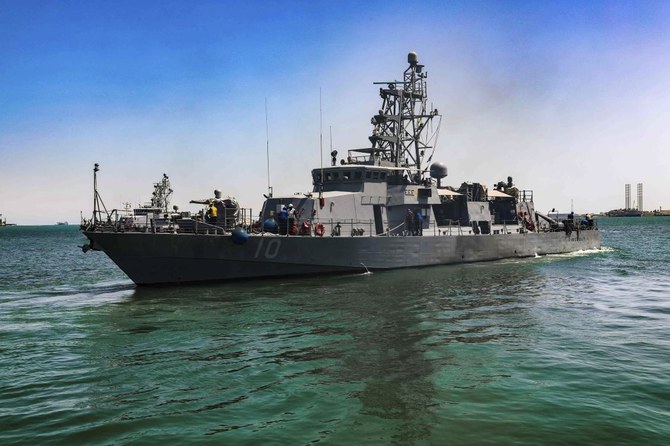
- The Navy said the Cyclone-class patrol ship USS Firebolt fired the warning shots after three fast-attack Guard vessels came within 62 meters of it
- The last time a Navy vessel fired warning shots in the Arabian Gulf in an incident involving Iran was in July 2017
Education in crisis: Gaza’s schools destroyed amid Israel’s war
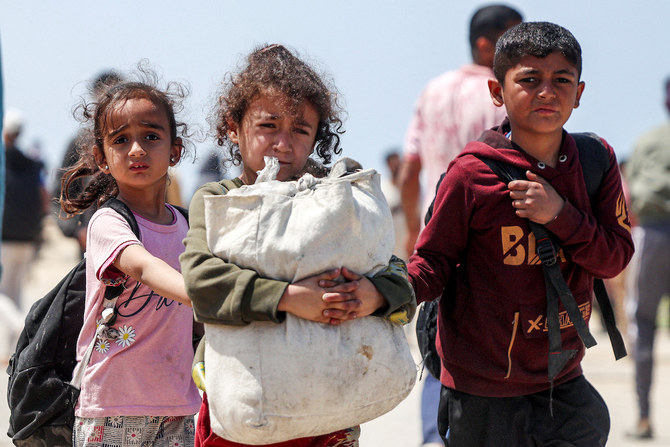
- March report found approximately 87.7 percent of school facilities in Gaza had been either damaged or destroyed
LONDON: The long-term potential of and opportunities for children in Gaza is being severely threatened by the Israel-Hamas war, charity Save the Children has said.
All schools in Gaza have been closed since Israel launched its offensive in October, impacting 625,000 students. Meanwhile, relentless airstrikes have destroyed every university in the Strip.
Ahmad, a displaced father in Rafah, shared his despair for the future of his three children. “I can’t see a life for them anymore,” he said.
For Ahmad and countless other parents, the primary goal is keeping their children alive.
But, said Save the Children, many are aware that even if they survive the immediate threats of bombings and starvation, their education and development will be hugely impacted.
A report published in March found approximately 87.7 percent of school facilities in Gaza had been either damaged or destroyed. A total of 212 school buildings received direct hits, while a further 282 sustained various degrees of damage.
Access challenges, especially in the North Gaza governorates, has led the Education Cluster to conduct a satellite-derived damage assessment to confirm the state of educational facilities.
According to International Humanitarian Law, schools generally should not be targeted and such attacks represent severe violations against children. Prolonged absence from school is considered likely to cause not just a break in learning but regression in progress, according to Save the Children.
Past experiences indicate that children are less likely to return to school the longer they are away from it, jeopardizing their prospects for economic well-being and mental and physical health. They also face increased risk of violence and abuse.
“Children have no escape from the reality of war, no stable routine, no opportunity to learn or play – and for many, no family. These are essential protective factors that children need to mitigate against the risk of lasting mental harm,” said a statement from Save the Children.
Children in Gaza have consistently expressed a strong desire to return to school, citing it as one of their top priorities for restoring a sense of normalcy and continuing their educational and social development.
“A few days ago, one of my children told me, ‘I want to eat healthy food. I really want to go to school and live my old, normal life. And I want to play’,” said Maher, a father in Gaza.
Save the Children has called for an immediate and comprehensive ceasefire and an end to the siege on Gaza.
It has urged the reopening of all crossings to ensure the flow of both commercial and humanitarian goods, as well as demanding that the Israeli government ceases unlawful attacks on educational facilities and fully implements the Safe Schools Declaration.
Denmark to close its Iraq embassy
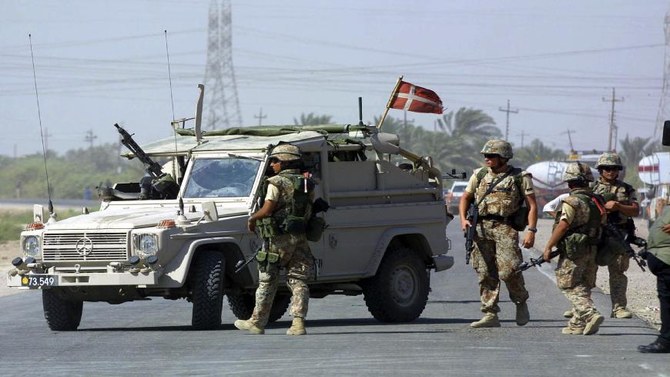
OSLO: Denmark will close down its embassy in Iraq on May 31, the Danish foreign ministry said in a statement on Tuesday.
The diplomatic mission in Baghdad was formally opened in 2020 to support the Danish command over and contribution to the NATO Mission Iraq (NMI).
The majority of the Danish military contribution has since been withdrawn.
Egypt, UN coordinator stress need for smooth aid delivery to Gaza
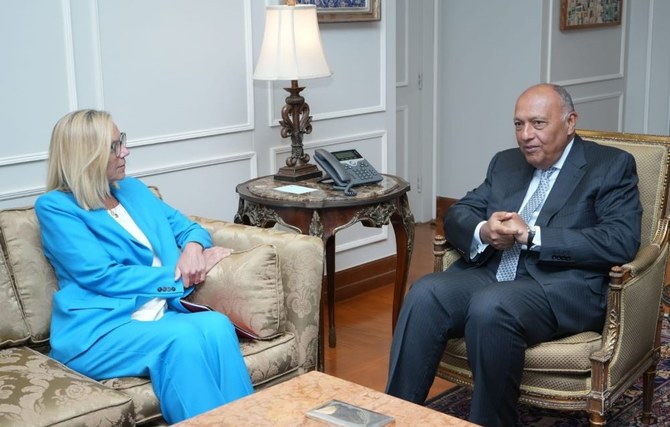
- Sameh Shoukry and Sigrid Kaag discussed the various facets of the humanitarian crisis in the besieged territory
- Kaag said she appreciated the pivotal role played by Egypt in containing the humanitarian repercussions of the crisis
CAIRO: Egypt’s Foreign Minister Sameh Shoukry and the UN’s coordinator for the Gaza Strip Sigrid Kaag on Tuesday discussed the various facets of the humanitarian crisis in the besieged territory, the volume and quality of aid entering it and the priorities regarding the type of aid.
The meeting took place at the Foreign Ministry’s headquarters in Cairo where the two sides reviewed the ongoing endeavors with various parties to expedite the launch of the UN mechanism as soon as possible.
They affirmed the inevitability of intensifying the volume of aid to meet the needs of the Palestinian people as well as providing the necessary protection for international relief personnel present in the Strip.
Shoukry reaffirmed the legal and humanitarian responsibility incumbent upon international parties to ensure the implementation of the provisions of Security Council Resolution 2720 and all other UN resolutions relevant to the situation in Gaza.
He stressed the necessity of dealing seriously and urgently with the humanitarian crisis in Gaza by reaching an immediate and permanent ceasefire, as well as sustaining aid access in a full, safe and intensive manner to all areas, the removal of impediments imposed by Israel in this regard and the opening of all land crossings to increase the flow of aid.
Kaag affirmed her keenness to continue coordination and consultation with Egypt to carry out her duties. She said she appreciated the pivotal role played by Egypt in containing the humanitarian repercussions of the crisis as well as the existing cooperation between the Egyptian Red Crescent, Egyptian civil society organizations and UN relief agencies to deliver aid.
Arab League condemns surge in West Bank settler attacks
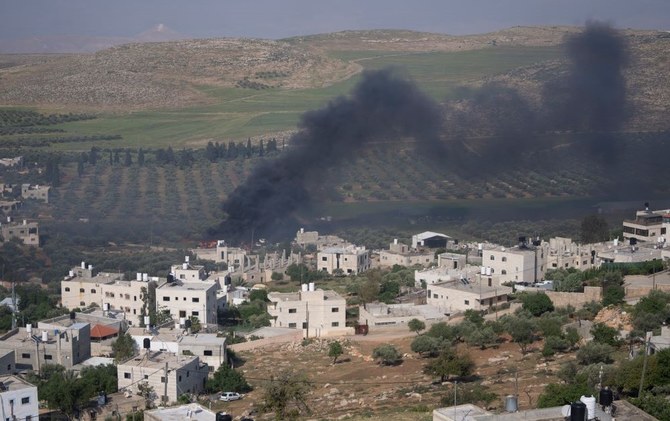
- Gamal Roshdy: Incidents of violent crimes, arson and property destruction perpetrated by armed settlers have seen a noticeable surge
- Tensions in the West Bank have been especially high since the outbreak of the Israel-Hamas war in the Gaza Strip on Oct. 7
CAIRO: The Arab League on Tuesday strongly denounced relentless attacks carried out by Israeli settlers on Palestinian cities and towns across the West Bank.
“These attacks, often perpetrated under the tacit approval and protection of Israeli authorities, are exacerbating a pervasive state of impunity and continued oppression of Palestinian lives and properties,” the league said in a statement.
Gamal Roshdy, the secretary-general’s spokesperson, said that while daily atrocities committed by Israeli forces in Gaza demand attention, they must not overshadow the escalating violence in the West Bank.
He added: “Incidents of violent crimes, arson and property destruction perpetrated by armed settlers have seen a noticeable surge, facilitated by a settler-led government that shields them from accountability.”
Roshdy warned that the imposition of sanctions by some countries on settlers, though a belated gesture, falls short of addressing the escalating crisis and safeguarding Palestinian civilians in the West Bank.
He called for action from the UN Security Council to end the “shameful cycle and the culture of impunity prevailing in the West Bank,” and to “hold these settlers accountable for their reprehensible crimes against the Palestinian people.”
Tensions in the West Bank have been especially high since the outbreak of the Israel-Hamas war in the Gaza Strip on Oct. 7.
On Friday, dozens of Israeli settlers stormed a Palestinian village in the Israeli-occupied West Bank, shooting at and burning houses and cars.
The Palestinian Foreign Ministry has strongly condemned the settler violations and crimes against Palestinians across the West Bank.
King Abdullah II: Jordan won’t become ‘theater of war’ between Israel and Iran

- King of Jordan reinforced the nation's commitment to upholding its security and sovereignty
- He said Jordan's aim was to safeguard its own sovereignty rather than defend Israel
DUBAI: Jordanian King Abdullah II said Tuesday that his country must not become ‘the theater of a regional war’ after Jordan intercepted multiple missiles and drones when Iran attacked Israel at the weekend.
The king reinforced the nation's commitment to upholding its security and sovereignty above all other considerations. He stressed Jordan's aim was to safeguard its own sovereignty rather than defend Israel.
Last weekend, Jordan was among a group of nations that helped Israel shoot down missiles, rockets and attack drones launched by Iran and its allies at Israel.
Earlier on Tuesday, Jordan's Foreign Minister Ayman Safadi said the international community should stop Israeli Prime Minister Benjamin Netanyahu from "stealing" attention away from Gaza by escalating his confrontation with Iran.
In remarks during a press conference with his German counterpart in Berlin, Safadi said Iran had responded to the attack against its consulate and had announced that it did "did not want to escalate further".
"We are against escalating. Netanyahu wants to draw attention away from Gaza and focus on his confrontation with Iran," Safadi added.
Iran's weekend attack caused modest damage in Israel and wounded a 7-year-old girl. Most missiles and drones were shot down by Israel's Iron Dome defence system and with help from the US, Britain, France and Jordan.
Iran -- which labelled its attack an act of self-defence after a deadly Israeli strike on its Syria consulate -- warned Jordan it could be “the next target”, a military source was reported as saying by Iran's Fars news agency.
(With Agencies)



